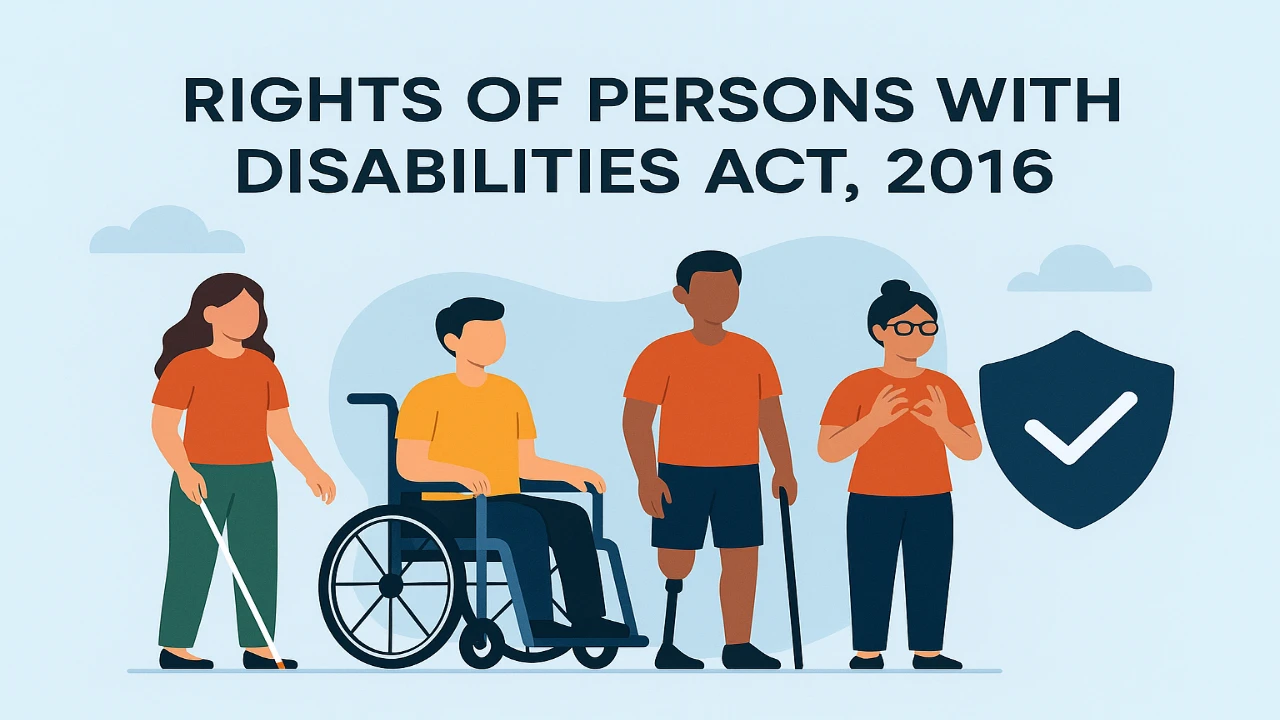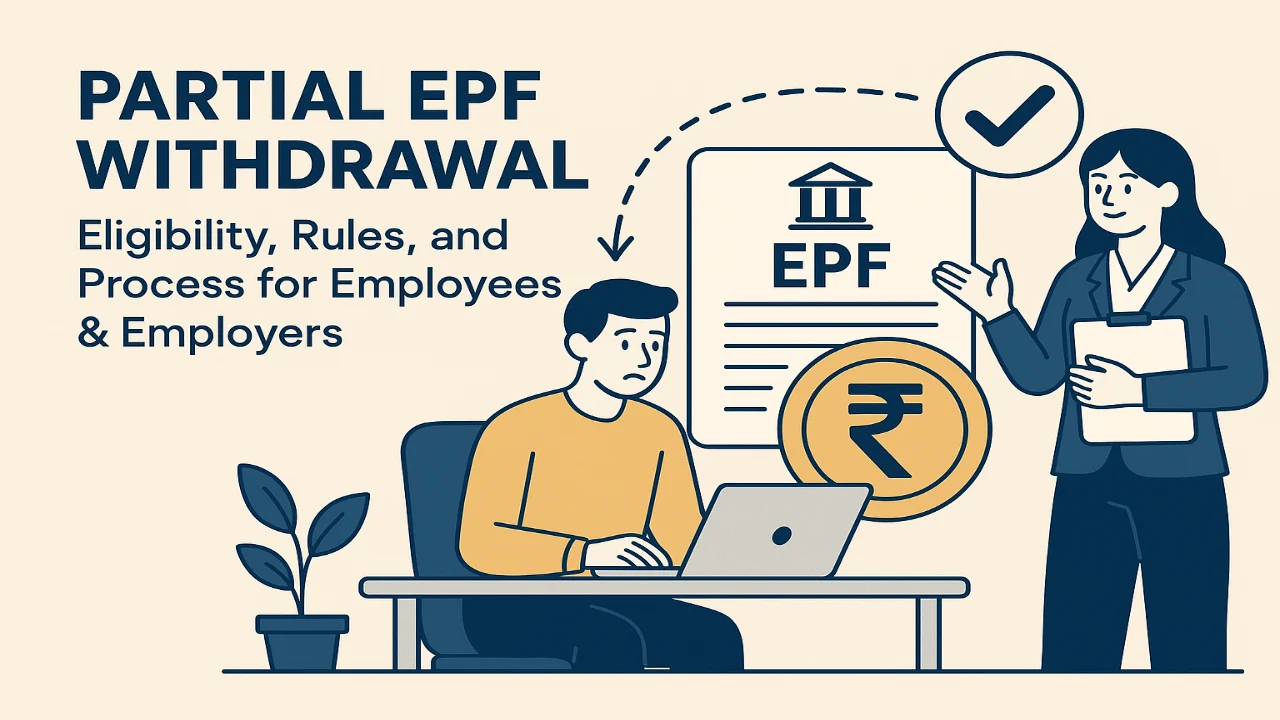The Rights of Persons with Disabilities Act, 2016 (RPwD Act) is a landmark legislation in India designed to protect and promote the rights and dignity of persons with disabilities. It replaced the earlier 1995 Act and expanded the scope to ensure a more inclusive and equitable environment for individuals with disabilities, especially in employment and social participation. This article explains the Act in a simple and clear manner to help both employees and employers understand its key provisions and benefits.
What is the Rights of Persons with Disabilities Act, 2016?
The RPwD Act was enacted to affirm the dignity, equality, and respect for persons with disabilities and to protect them from discrimination. It recognises 21 different types of disabilities, an increase from the 7 types recognised in the previous law, and includes conditions such as cerebral palsy, autism, muscular dystrophy, acid attack victims, and specific learning disabilities, among others.
Key Objectives of the Act
- Ensure equality, non-discrimination, and dignity for persons with disabilities.
- Promote full participation of persons with disabilities in society.
- Provide access to education, employment, and social services.
- Guarantee reasonable accommodations in workplaces and public spaces.
- Strengthen the rights of women and children with disabilities.
Rights and Benefits for Employees with Disabilities
- Right to Equality and Non-Discrimination: Employees with disabilities must be treated as equals. Discrimination based on disability in recruitment, training, promotion, and compensation is prohibited.
- Reservation in Government Jobs: At least 4% of vacancies in government posts are reserved for persons with benchmark disabilities.
- Job Security: If an employee acquires a disability during employment, they cannot be dismissed. They can be transferred to a suitable post without any reduction in pay.
- Reasonable Accommodations: Employers must provide necessary adjustments or assistive devices to enable employees with disabilities to perform their duties effectively.
- Safe and Accessible Workplace: Workplaces should be made accessible with ramps, adapted furniture, and other facilities to support persons with disabilities.
- Protection from Harassment: Employees have the right to work in a harassment-free environment, with policies in place to address any discrimination or bullying related to disability.
- Right to Inclusive Training: Persons with disabilities should receive appropriate training and skill development opportunities to grow within the organisation.
Responsibilities and Benefits for Employers
- Equal Opportunity Policy: Employers must frame and publish an Equal Opportunity Policy that outlines the benefits and facilities provided to employees with disabilities.
- Liaison Officer Appointment: Organisations with 20 or more employees are required to appoint a Liaison Officer to oversee recruitment and welfare of persons with disabilities.
- Reservation in Private Sector: While the mandatory reservation mainly applies to government jobs, private employers are encouraged and incentivised to hire persons with disabilities, including financial support and tax benefits.
- Barrier-Free Environment: Employers must ensure that their premises are accessible and inclusive, enabling persons with disabilities to work comfortably.
- Fair Evaluation and Promotion: Recruitment, transfers, training, promotions, and career development processes should be inclusive and non-discriminatory.
- Maintenance of Employment Records: Organisations are required to maintain records of employees with disabilities and the facilities provided to them.
Practical Impact for Employees and Employers
For employees with disabilities, the Act provides empowerment, job security, and dignity at work. They can request reasonable accommodations and should be given fair consideration in hiring and career progression.
For employers, the RPwD Act provides a clear framework to foster an inclusive workplace, avoid legal penalties for discrimination, and benefit from government incentives. Cultivating an inclusive work environment also leads to enhanced diversity, better teamwork, and innovation.
Conclusion
The Rights of Persons with Disabilities Act, 2016 is a progressive law aimed at creating an equitable society where persons with disabilities can live and work with dignity. Understanding this Act helps employees know their rights and employers to create a supportive work culture that benefits everyone. Inclusive workplaces are not only lawful but also foster diversity and productivity, making them a win-win for society and businesses alike.
If you are an employer or an employee, embracing the principles and provisions of this Act will contribute significantly to building a more just and accessible environment.
FAQs on the Rights of Persons with Disabilities Act, 2016
1. What is the Rights of Persons with Disabilities Act, 2016?
It is a law enacted in India to protect and promote the rights and dignity of persons with disabilities by ensuring equality, accessibility, and non-discrimination.
2. Which disabilities are covered under the Act?
The Act recognises 21 types of disabilities, expanding beyond the earlier 7 recognised types, including autism, cerebral palsy, muscular dystrophy, and specific learning disabilities.
3. What rights does the Act provide to employees with disabilities?
Employees have rights to non-discrimination in recruitment, promotions, job security, reasonable accommodations, and a safe, accessible workplace.
4. Are there job reservations for persons with disabilities?
Yes, the Act mandates at least 4% reservation in government jobs for persons with benchmark disabilities.
5. What is ‘reasonable accommodation’ under the Act?
It means necessary and appropriate modifications or adjustments in the workplace to enable persons with disabilities to perform their duties without undue hardship.
6. What are the responsibilities of employers under the Act?
Employers must ensure non-discrimination, maintain accessible workplaces, appoint liaison officers (in larger organisations), provide equal opportunity policies, and maintain records of employees with disabilities.
7. Does the Act apply to private sector employers?
While mandatory reservation is primarily for government jobs, private employers are encouraged and incentivised to hire persons with disabilities and provide accessible environments.
8. What if an employee acquires a disability while employed?
The employee cannot be dismissed; they may be transferred to a suitable post with the same pay and benefits or kept on an additional post until retirement if necessary.
9. Are public buildings required to be accessible?
Yes, all public buildings must be made accessible to persons with disabilities, including government offices, workplaces, transport hubs, schools, and hospitals.
10. How can discrimination complaints be addressed?
Employers with 20 or more employees must have mechanisms to handle complaints of discrimination and provide justifications if any actions are taken that may affect employees with disabilities.
Check out More Helpful Articles :
- Maharashtra Workmen’s Minimum House Rent Allowance Act, 1983 – Complete Guide for Employees & Employers
- PM Viksit Bharat Rozgar Yojana (PM-VBRY): A Complete Guide for Employers and Employees
- Performance Improvement Plan (PIP): A Complete Guide for Employees and Students



